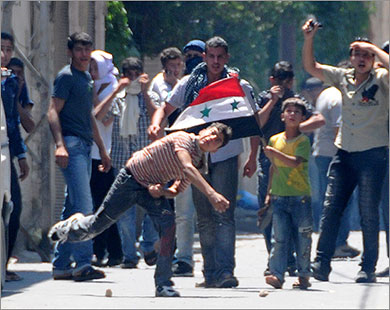A former army commander who now leads a military council trying to organise armed resistance to Syrian President Bashar al-Assad said air strikes on forces spearheading his military crackdown would be the only way to avoid a protracted civil war, Today's Zaman reported.
Western and regional powers grappling with how to support the year-long uprising against Assad should shed a reluctance for military action and consider air strikes to force out the Alawite ruling elite, General Mustafa al-Sheikh told Reuters.
This would preserve the structure of the armed forces and incur less bloodshed than arming the mostly Sunni Muslim rebels, as advocated by Saudi Arabia and other Gulf states, the Sunni commander said.
"You will not need a long air campaign. Seventy percent of the Syrian military is already out of action and air strikes would be a message to the Syrian people that the international community is really with them," he said, referring to Sunni soldiers who make up the bulk of the army and ten of thousands of whom are now confined to barracks.
Western powers have little appetite for military intervention in Syria and the NATO military alliance has ruled out a repeat of last year's air campaign in support of rebels who toppled Libyan leader Muammar Gaddafi.
Sheikh said chaos was brewing in Syria because many civilians were joining the rebels after their relatives were killed, imprisoned or tortured by Assad's Alawite led-forces.
"They're badly outgunned and still want revenge. They will be emboldened if they get serious weapons. Nothing will control them," he said during an interview at a dusty camp for defecting Syrian officers near the border with Syria.
Sheikh pointed to people in a nearby tent paying condolences to an officer from Hama province. Twelve of his relatives were hacked to death in an attack by Alawite forces on the Sunni village of al-Latmana this week, Sheikh said
"How do you expect his family to react? What do you expect the relatives of those who were raped and tortured to do? The regime is inviting revenge," Sheikh said.
The United Nations says Syrian forces have killed 9,000 people since the uprising against Assad erupted in March last year. Syria blames foreign-backed militants for the violence and says they have killed at least 2,500 soldiers and police.
Syria has agreed to withdraw forces from cities before a ceasefire on Thursday, but has insisted on written guarantees from rebels and regional powers for a halt to opposition violence. Bloodshed has continued unabated, casting doubt on the proposed truce.
Sheikh fled his post in the northern command of Assad's army among ground forces based in Aleppo in January and crossed with his family to neighbouring Turkey. Eight other generals have since joined him on the Higher Syrian Military Council to create a centralised command structure for the rebels.
Their efforts have had limited success, with links still weak with rebels on the inside and divisions among the officers in exile, including a rift between Sheikh and Colonel Riad al-Asaad, the nominal head of the Free Syrian Army, who sits on the council.
Sheikh estimated the total number of soldiers who have deserted at 50,000 out of the 280,000 military. Tens of thousands more Sunni soldiers have been confined to their barracks but cannot desert because of the grip of military intelligence and lack of safe areas, he said.
The military forces Assad is sending to towns and cities across the country to put down the revolt number no more than 60,000, the grey-haired general said.
"Bashar does not need many infantry because he is relying on artillery, tanks and missile squadrons in the hands of his loyalists. Once those are hit he is finished," Sheikh said.
"The rebels are badly outgunned. There are no weapons coming to them from Turkey, and the ones being smuggled from Lebanon and Iraq are of such bad quality," he said.
Sheikh said the air strikes could be similar to those by NATO on Serbian troops two decades ago and the ones that helped topple Libya's leader last year, targeting the Fourth Armoured Division and the Republican Guards - the army's best equipped units, under the grip of Assad's brother Maher.
"Preferably air strikes would be accompanied by the establishment of safe zones that will draw in the army divisions who want to defect but currently cannot," he said.
Turkish Prime Minister Recep Tayyip Erdogan has repeatedly said setting up a "safe" or "buffer zone" along the border was an option, but the United States has ruled out military action.
"I realise that there has been no appetite from the international community to intervene to such degree," Sheikh said. "Seeing the regime's increased brutality, they should recalculate."
Ex-Syrian army commander calls for air strikes on Assad troops
A former army commander who now leads a military council trying to organise armed resistance to Syrian President Bashar al-Assad said air strikes on forces spearheading his military crackdown would be the only way to avoid a protracted civil war.






